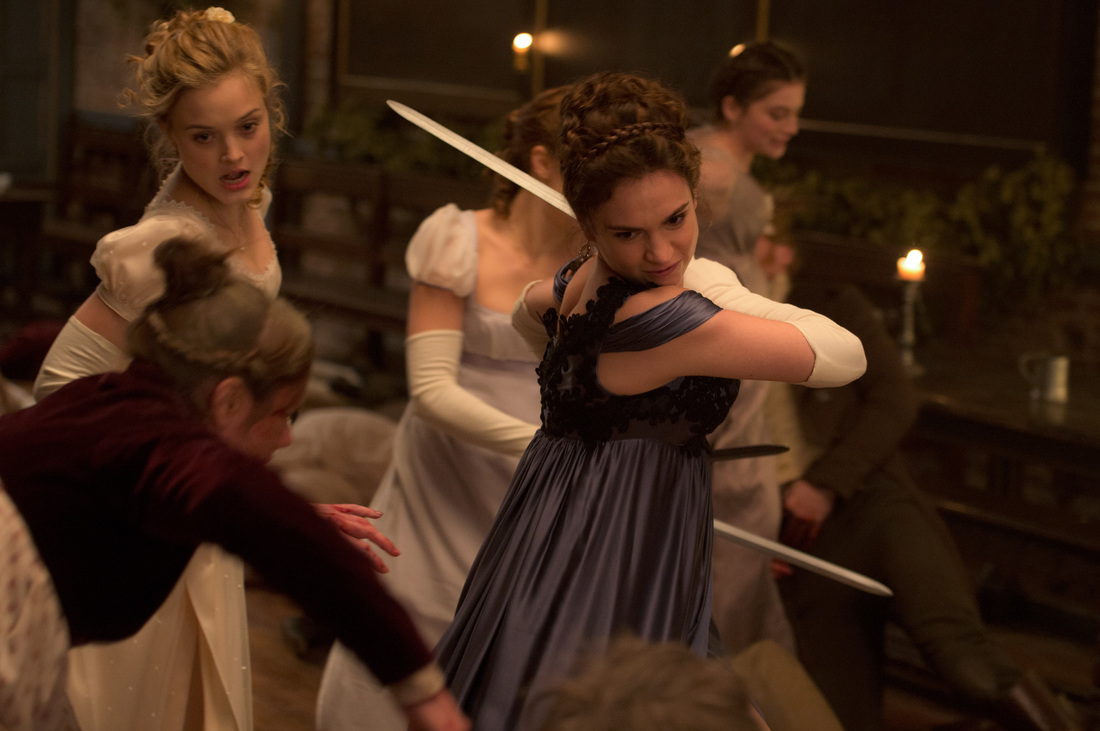This was not the case. The narration at the beginning of the film tried to tie the zombies into history, which was interesting but didactic (it was also ironic that the zombie virus came to Europe from the Americas, when historically the Europeans were the ones who spread disease to the area—but I digress).
The movie’s writing was overly-exhibitionist in its attempts to be consistent with Austen’s original characters. They address each other by full name even when situationally inappropriate and explain relationships in too much detail, so nearly every action and relationship in the movie felt contrived. Other characters appear so out-of-the-blue that viewers who have not read the book(s) will undoubtedly be lost. In short, this movie did everything that writers are not supposed to do
There were some scenes and lines that were taken directly from the novel(s), but they were taken out of context. Essential character traits were also drastically changed to suit the film. For instance, Elizabeth Bennet (Lily James) throws a tantrum after Mr. Darcy (Sam Riley) rejects her, which never happened in Austen’s book and derails Elizabeth’s independent, cynical personality.
The zombie aspect of the movie was not as gripping as I’d hoped. The undead were inconsistent—some fast (like in 28 Days Later), some slow (like in Night of the Living Dead), and some just like the living. The zombies were also neither scary nor funny. Some scenes would have fit in a horror movie, but most inspired pity for the zombies. In addition, the zombies at first seem capable of passing as normal people, then others were deranged, some cruel, some unintelligent, and some kind. These qualities can work on their own, but it seems as if director Burr Steers could not make up his mind.
I still can’t decide if Pride and Prejudice and Zombies was meant to be funny or not. The original was always intended as comedic, but many of the novel’s funny scenes are left out. In any screen adaptation of literature, scenes must be cut. But the choice in scenes was bizarre. Mr. Collins’ (played by Matt Smith) proposal to Elizabeth, for example, was funnier in the original book. Jokes also missed their marks: Mr. Darcy’s declaration of “Darcy, Colonel Darcy” was an over-played Hollywood trope that’s rarely funny anymore, and was especially irrelevant in this context. The ending also struck me as ridiculously idealistic (absent of zombies despite supposedly taking place during a zombie apocalypse) and lacking any indication of satire. It was uncomfortably out-of-place.
Finally, there was great focus on the sexual spectacle of women fighting zombies. If this had been a consistent theme in the cinematography, it would have some artistic merit. Yet the camera didn’t call enough attention to it for it to be thematically exhibitionist while the sexual attention was not subtle enough to go unnoticed. Lily James’ breasts seemed to occupy center-screen more often than her face. Here, sexual focus came off as a thinly-veiled, artless attempt to use the actresses’ physical appeal as marketing for the movie.
It seems as if Director Burr Steers ambitiously took on a lot of great things at once (i.e., Pride and Prejudice, zombie movies, comedy). This gave him many areas in which he could have excelled—but Pride and Prejudice and Zombies fell short of expectations in each of these areas. It had none of Jane Austen’s wit, zombie films’ horror, or satire’s comedic timing. Even the period film aspect of the movie was unsatisfactory: note that Mr. Darcy imitated James Bond in addition to mysteriously donning a leather jacket for most of the movie. Pride and Prejudice and Zombies was entertaining enough, but I do not advise buying a ticket for this movie.
Grade: D-

 RSS Feed
RSS Feed
